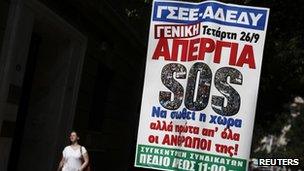Europe: Greek anger
- Published
- comments

The strike, called by the two largest unions, will test the mood of the country
A general strike is under way in Greece. It follows a familiar pattern. The Greeks stay off the streets in the heat of the summer but resume their protests in the Autumn.
This strike matters because it is the first since the Conservative Prime Minister, Antonis Samaras, came to power in June. It has been called by the two largest unions and will test the mood of the country. Three thousand police have been deployed.
The strike is against the new austerity measures that are being planned. The government has to find at least 11.5bn euros (£9bn) of savings over the next two years. The expectation is that, yet again, public sector wages and pensions will be reduced. The retirement age could be increased to 67.
Watching over this is the troika of the EU, the IMF and the ECB. They must decide whether Greece has met the conditions of an earlier bailout to qualify for 31bn euros of further funding. Without the funds the country would face bankruptcy.
High risk
The negotiations have become increasingly tense. Some 2bn euros of cuts suggested by the government were dismissed by the troika as unconvincing. There are reports of a row between the government and the IMF, which is increasingly taking a hard line. One report had the Greek finance minister, Yannis Stournaras, asking the IMF: "Do you want to overthrow the government?"
All sides are under pressure. The governing coalition led by Mr Samaras is fragile. If it were to collapse in the face of a public backlash it would open the way for fresh elections. The likely victor would be the left-wing Syriza party, which has promised to tear up the bailout agreement altogether.
The IMF is also coming up against its own rules. It cannot keep lending to a country that is judged unable to meet its targets. The head of the IMF, Christine Lagarde, has warned Greece there is still a "financial gap". The IMF is facing criticism for lending more and more money at increasing risk.
The troika has suspended its meetings for a few days to allow things to cool down. Its report, expected in October, will determine whether Greece receives more money.
Over the summer both the German chancellor and the French president indicated strongly they wanted Greece to stay in the euro. The risks of an exit were judged too great.
But what happens if the people of Greece indicate they are not prepared to accept further austerity?
One Greek poll found that 90% believed the latest cuts were "unfair". That would suggest that implementing any agreed programme will be as difficult as before. That will put Europe's leaders in the position of deciding whether to back a strategy which almost certainly will fail.
One final observation: Greece has seen its economy shrink by 20% in five years. By 2013 that figure will have risen to 25%. Those are figures, as the Greek prime minister has said, associated with the Great Depression.